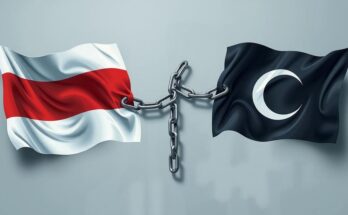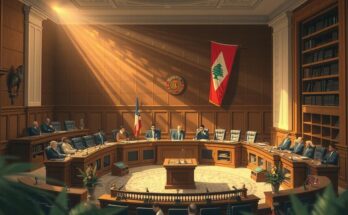Felix Tshisekedi and Paul Kagame met in Qatar to discuss the security crisis in eastern DRC, with mediating support from the Emir. They reaffirmed commitment to an immediate ceasefire and emphasized direct political dialogue to resolve underlying conflicts. This meeting follows the M23’s recent territorial gains and ongoing accusations of Rwandan involvement, highlighting the pressing need for regional stability and cooperation.
On Tuesday, Felix Tshisekedi, President of the Democratic Republic of the Congo (DRC), and Paul Kagame, President of Rwanda, convened in Qatar for discussions aimed at addressing the escalating security crisis in eastern DRC. Mediated by the Emir of Qatar, the meeting sought to foster dialogue amidst accusations from Kinshasa regarding Rwanda’s support for the M23 rebel group, which has taken control of substantial areas in the South and North Kivu provinces.
Various regional organizations have made prior attempts to bring these leaders to the negotiating table, but this session was notably facilitated by the Emir, marking a significant step forward in relations. Sources indicate that the meeting commenced at 4 PM local time and continued for approximately 45 minutes, described as having a cordial atmosphere, likely due to the Emir’s previous involvement in a planned January meeting that was ultimately canceled.
Political analyst Tresor Kibangula highlighted that increased Western sanctions are beginning to impact Kagame, while Tshisekedi appears more open to discussing terms with the M23, especially following recent territorial gains by the group in key areas such as Goma and Bukavu. The shifting dynamics on the ground have prompted a reconsideration of previous stances.
Following their discussions, both leaders expressed a commitment to an immediate ceasefire, a decision reached concurrent with unsuccessful peace talks scheduled in Angola. A source associated with the Congolese presidency noted the clandestine nature of their meeting, which was only disclosed after Tshisekedi’s return to Kinshasa. A joint statement confirmed all parties’ pledge to adhere to a ceasefire as previously agreed at an African summit held last month.
Additionally, the discussions emphasized the urgent necessity for direct political dialogue aimed at tackling the fundamental causes of the ongoing conflict in eastern DRC. The Rwandan presidency echoed this sentiment, suggesting that progress could be made rapidly if all involved parties work collaboratively. Furthermore, the Congolese presidency communicated that the specifics of the ceasefire agreement would be formulated in the coming days.
The backdrop to this meeting showcased the challenges in prior peace negotiations, particularly highlighted by Angola’s announcement that peace talks were abruptly cancelled after the M23 group’s withdrawal. The M23 expressed accusations of external sabotage by certain international institutions, specifically pointing to sanctions imposed by the European Union that they claim inhibit meaningful dialogue. They also criticized the DRC’s aggressive rhetoric as a barrier to further discussions.
Although the M23 has asserted it aims to protect the rights of Congolese Tutsis, its rapid military advancement raises international alarm. The DRC has reported extensive fatalities attributed to the group’s offensive, with estimates suggesting over 7,000 casualties. A UN report indicated that Rwanda holds considerable influence over the M23, allegedly providing military support to exploit the region’s resources. Rwanda denies these claims, citing threats posed by the Democratic Forces for the Liberation of Rwanda (FDLR), a group associated with the 1994 genocide. This meeting is regarded as the first formal dialogue between the Congolese government and the M23 since 2013.
The recent meeting between Presidents Tshisekedi and Kagame marks a pivotal development in addressing the security crisis in eastern DRC. Efforts to establish a ceasefire and initiate dialogue suggest a willingness from both sides to seek resolution amidst a backdrop of escalating tensions and accusations. The involvement of external mediators highlights the complexity of the situation, as both nations grapple with regional stability and the implications of ongoing military actions. Continued engagement between the leaders, along with cooperation in discussions about underlying issues, will be essential for fostering a lasting peace in the region.
Original Source: www.rfi.fr




